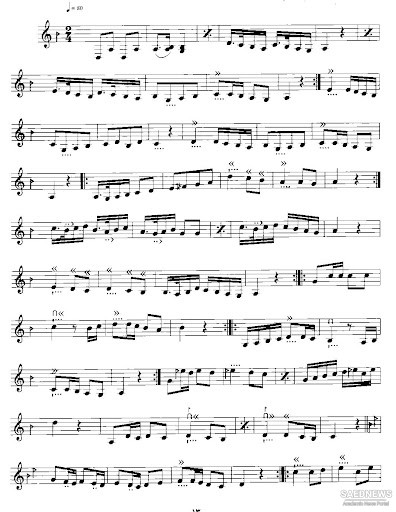Not only is Shur the dastgah with by far the greatest number of gusheh-ha, but it is also the most popular one. Shur might even by considered as a kind of basic Persian mode since it is parent to four secondary dastgah and is related through modulatory gusheh-ha to several more. The name Shur reflects its popularity, for it means "spicy" or "clever."
The scale of Shur is similar either to the Western natural minor scale with the second degree lowered by a quarter tone or to the phrygian mode with the second degree raised by a quarter tone: C D E F G A Bb C. Both the shahed and ist are the first note, C. The moteghayer is the fifth note, which is lowered to G-koron for the gusheh of Shahnaz. The note on which the daramad Starts is frequently the seventh scale step, B-flat.
Because Shur is so popular, there are several acceptable versions of the daramad. The most usual is the one given in Examples 7-11. These melodies feature an ascent to the fourth scale degree and a slower, more ornamental, descent. The second degree, D-koron, which forms a neutral second with the tonic, is particularly stressed in all examples. Another version of the daramad of Shur, shown in Example 12, descends a fifth rather than ascending a fourth.
Some of the important gusheh-ha of Shur are Shahnaz, Salmak, Gereyli, and Razavi on the fourth scale degree, and Bozorg and Hosseini on the eighth. The rast kuk for Shur is: G or A for the tar and sehtar, G for the santur, and A for the violin.

According to Khaleqi, the dastgah of Shur contains so many nuances that its character cannot be defined simply and will differ considerably according to the listener. In Khaleqi's opinion, Shur has an association of seriousness, as do most of the Persian dastgah-ha. He says that Shur is a counselor, one who gives moral teaching. The voice of Shur is noble, mystic, and near to the spirit of the Iranian people. It is an older person speaking—not like Dashti, who is a youth who cannot control his sadness and cries easily. When hearing Shur we see lovely scenery— gardens, flowers, rivers. Hearing this causes us to be silent in order to appreciate the silence of nature. The sentiment of Shur is one appreciated by Oriental people.


 Persian Classic Music: An Alternative Sense of Melody and Rhythm
Persian Classic Music: An Alternative Sense of Melody and Rhythm














































